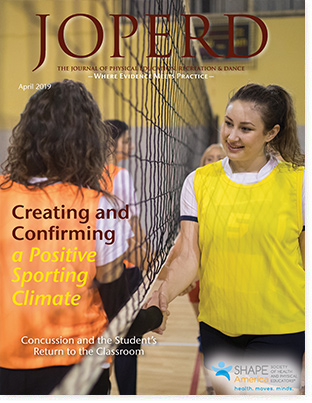 JOPERD Table of Contents
JOPERD Table of Contents
Creating and Confirming a Positive Sporting Climate
Colin Pennington

Positive moral socialization can occur through physical education (PE) and sport participation since both provide learning environments where participants have the opportunity to learn competition, cooperation, role-playing and discipline regarding rules, regulations and goals. In this sense sports can be seen as a laboratory of human experience and citizenship (Pennington, 2017). Students who develop prosocial competence during the years of their formative education are more likely to be successful throughout their lives (Hellison, 2011), promoting the belief that character and positive sporting behavior is what we are supposed to teach in educational athletics more than anything else (Engh, 1999). Furthermore, some scholars suggest that physical activities (such as PE or sporting events) provide cathartic benefits by releasing participants’ restrained emotions (Baron & Richardson, 2004). This leads some to make the assertion that participation in sport and physical activity — under appropriate leadership and guidance — can help young people appreciate health, exercise and fitness; learn about themselves and how to handle adversity; and experience teamwork and prosocial attitudes in a safe environment (Giebink & McKenzie, 1985; Naylor &Yeager, 2013; Pennington, 2017).
For years a large number of young students and athletes have enrolled in one or more “moral reasoning in sport” courses aimed at improving their moral reasoning and positive sporting behaviors 16 Volume 90 Number 4 April 2019 (Gehring, 2005; Hellison & Walsh, 2002; Martinek, Schilling, & Johnson, 2001; Raakman, 2006). During this period the behaviors of course participants have become more prosocial. Specifically, most PE participants and youth student-athletes stated that they saw the importance of prosocial behavior and developed social relationships outside of the sport realm. Unanimously, the participants stated that they now think before they act, especially when in group situations (Lyons & Turner, 2015). This leads some scholars to conclude that deliberately aiming to improve PE and sport participants’ character and sporting behaviors is a worthwhile endeavor (Naylor &Yeager, 2013).
However, very limited research explains students’ positive responses to specific motivational climates in sport, and many physical educators do little more than casually observe the sporting behaviors of students in their care. Therefore, the purpose of this article is to encourage physical educators and youth coaches to develop and maintain a task-mastery motivational climate and to provide physical educators and youth coaches a tool to assess the presence of positive sporting behaviors.
To read the rest of this article, click here to download a pdf.